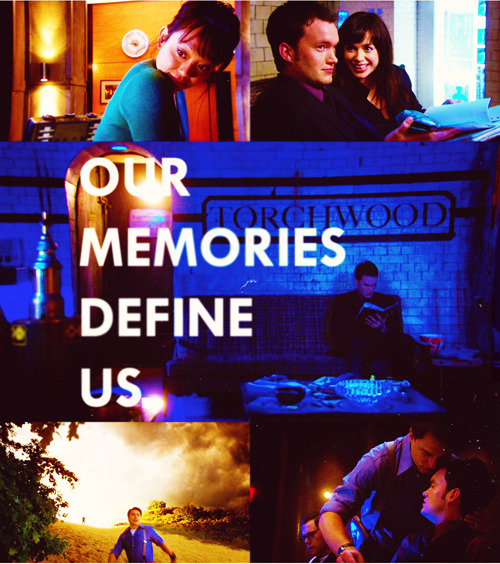The episode “Adam” from the second season of Torchwood
explores some interesting philosophical territory. An alien has infiltrated the Torchwood team, and has implanted himself in the memories of the team members so that they remember him being part of their group for the past three years. More than that, he has given Tosh memories of their having kissed for the first time exactly a year before, and of their subsequent relationship. And this alien, whom they know as “Adam,” has even tampered with their memories more generally, making Toshika more confident as a result, and Owen less cynical (and more like a lovesick puppy dog pining after Toshika). And in implanting the memory of him in Gwen’s mind, he accidentally causes her to forget her fiancée, Rhys.
 Adam is mainly out to survive – if he is not remembered, he ceases to be. But his power to implant memories can also be used as a weapon, as we see when Ianto becomes suspicious of Adam, and Adam responds not only by removing Ianto’s memories of being suspicious but also implanting memories of himself having stalked and strangled three women.
Adam is mainly out to survive – if he is not remembered, he ceases to be. But his power to implant memories can also be used as a weapon, as we see when Ianto becomes suspicious of Adam, and Adam responds not only by removing Ianto’s memories of being suspicious but also implanting memories of himself having stalked and strangled three women.
All of this raises the question of whether who we are is just the sum of our memories. Can love be inserted and removed just by inserting or removing memories of the person and of feeling a certain way towards them? Can a person who is gentle and kind be turned into a homicidal monster if one inserts into them memories of stalking and killing people and enjoying doing so?
 And when we consider Adam’s claim to have made Tosh and Owen “better,” and that Tosh genuinely loved Adam, we are led to reflect on the morality of tampering with memories – and to reflect on other explorations of the same topic, such as Dollhouse
And when we consider Adam’s claim to have made Tosh and Owen “better,” and that Tosh genuinely loved Adam, we are led to reflect on the morality of tampering with memories – and to reflect on other explorations of the same topic, such as Dollhouse and Eternal Sunshine Of The Spotless Mind
. In the latter film, of course, this was a procedure that one could pay for, and it involved merely the removal of memories. As a result, characters often found themselves back where they were previously, headed down the path to make new memories just like the ones they erased. What if they could have changed and not merely erased memories? They would perhaps then be different people.
If we could turn a convicted serial killer or pedophile into a person with normal thoughts and desires, by rewriting their memories, would it not be justified to do so? Would it be more humane and more productive than merely putting them in prison?
And when it comes to our real memories (which of course are not so accurate that “real” is always a suitable descriptor), we don’t have complete freedom of choice when it comes to making them. Even our falling in love is only somewhat under our control, involving instincts that defy our attempts to impose logic upon them or remove them once they have appeared. Is Jack Harkness’ evaluation that Adam had wronged Tosh by forcing himself and the false memories on her a valid one?
If technology is developed that allows us to shape our memories by choice or the memories of others against their wills, would it ever be justified to use it? The episode “Adam” from the second season of Torchwood provides a great starting point for discussing that topic. But it also gets at the question that already faces us: In what ways do our memories define who we are?













